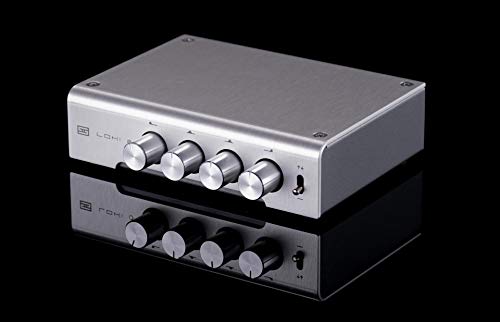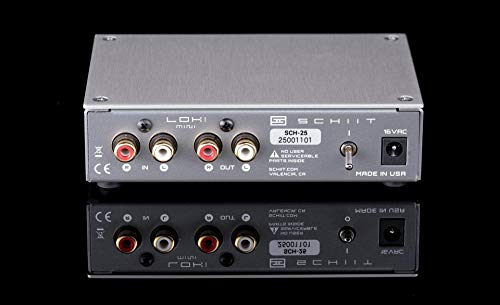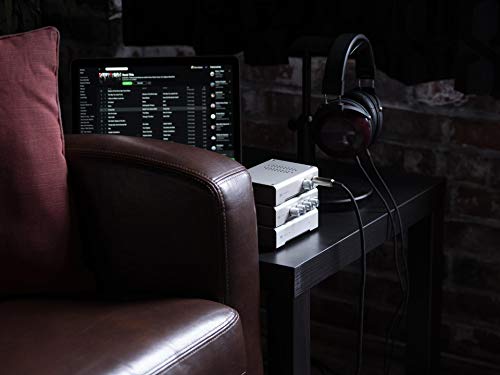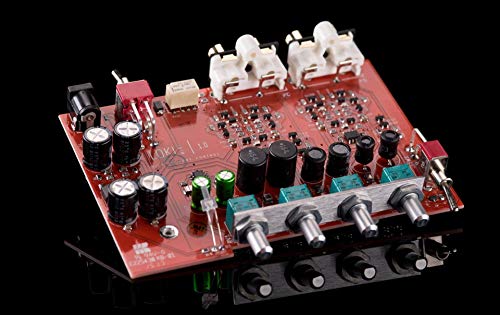- Super-high-fidelity, low noise
- Use it to adjust for imperfections and/or tune your system to the way you want it to sound
- Has a single, discrete, current-feedback gain stage, coupled to passive LC filters for 3 bands, plus a gyrator for the bass
- Utilizes adjustment knobs with rational ranges to allow fine control. 115VAC, USA Plug.
- Has a 100% passive bypass setting to offer the transparency and flexibility you need
-
Information
-
Twitter
-
Pinterest
-
Youtube
-
Facebook





Jasmin Lingad
Perfect!
Works better than I expected! It’s nice to be able to control the way my records sound with it. I have it between the Schiit Vali 2 and Schiit Mani Highly recommend both!
Susan Jordan
Great Schiit
This is truly an excellent piece of audio equipment. The controls are also great offering a wide range of precise controls in practical ranges. The controls are also nice and subtle to tinker with the sound but not be overpowering. If you want to add the right sparkle or help reduce the sibilance of a bright system with that being the only change this is the perfect tool. The sound is transparent and free from noise/distortion with only the color being changed as you want it to be. It is impossible to tell the difference between flat controls and bypass for for both headphones and some high end bookshelf speakers ive built (details at bottom). Overall this is a serious piece of audio gear and well worth the $175 i paid for it. My System: DACs: (SMSL M8 or HRT Music Streamer 2+ Both $250) Line Level: (Loki and/or Magni Pre Out) Amplifiers: (2x Emotiva A100 $200Each) or Magni3 Crossover: (Passive Line Level Harrison Labs FMOD 2.5Khz) Speakers: (Aurum Cantus G1 Ribbon Tweeter $600Pair) Morel TSCM634 Midbass $800Pair) in ported bookshelf speaker cabinets Headphones: Grado Sr325e and Audio Technica ATHM50X Accessories: Tripp Lite HT10DBS Blue Jeans Cable Lc-1 RCA cables KnuKonceptz 10-2 speaker wires
Marcena C Caple
All i want to say is THANK YOU! SCHIIT TEAM👍
In love as always.i been using schiit audio products for almost 3 years and i can say for sure they have never disappointed me in there build quality and specially the sound quality. In heaven
Rosa Murphy
Excellent analog EQ
I've owned the Loki since it's release years ago, and it's been a great addition to my audio chain (headphones primarily). It's small, well built, and doesn't seem to degrade the audio signal. The four frequency response area's they chose are broad and useful. Want more sub-bass? Far left knob. Lower mids? 2nd to the far left. Upper mids/lower treble? 2nd to the far right. Treble? Far right. Easy peasy. Another word on signal degradation. Again, I perceived none. I listened to well known tracks without the Loki in the system chain, then added it into the chain with all the knobs at the zero point (meaning straight up, no EQ being applied). Then I listened with the master switch in the off position (meaning no EQ applied regardless of knob position). In all instances I noticed no difference in sound quality. My equipment is good (lossless audio files, Codex dac, Lake People RS-08 amp, and the following primary headphones: HD800, HD650, ZMF Atticus, Beyerdynamic T70, and quite a few more over the years, but that I no longer own. No sound difference. That's impressive to me, and very important, given the time and money spent assembling a nice audio chain. I really like two things about the Loki's functionality, the way the knobs click into the zero point position (meaning no EQ applied, straight up), and the on/off master switch on the front of the unit. I especially love that switch, as it allows me to quickly and easily review my EQ settings. I turn it on, fiddle with the knobs, then toggle the EQ on/off to hear the differences. And let me tell you, sometimes you forgot just what your stuff sounds like pre-EQ! I often was shocked how much I tweaked the sound, when I'd toggle the EQ on/off. It's a nice feature. Finally, the adjustments themselves are quite useful. A word of warning though, not all headphones take EQ equally. Some have no issues with it, and don't lose much if any sound quality. Other's seem to hate it and break down easily. Generally speaking, I found the best results with planar magnetic sets. It must be the driver's physical design, as every one I've tried took even heavy handed adjustments quite well, with minimal added distortion. Traditional dynamic headphones seem to fair the worst, in my experience. In the middle are beyerdynamic Tesla driver models. They don't take heavy handed EQ as well as planars, and start distorting, but they resist distortion better than something like the HD650. I'll list specific headphones below and my experiences: The Good (headphones that responded to heavy EQ well with little to no added distortion): MrSpeakers Mad Dog series, Alpha series, Aeon series, Ether series (I've owned them all except the Ether 2) HD800 T70, T90, DT 1770, DT 1990, T1 Gen2, T5p Gen2 Hifiman - HE400i, HE560 (owners beware, hifiman is notorious for poor quality control, and at local headphone meets I've talked to owners of these sets say adding EQ on the bass broke their drivers. I did not experience this myself, but both my sets listed here did die later while listening without any EQ on. I personally attribute my failures to poor QC in general, as both these sets have long histories of driver failures) The Bad (headphones that responded poorly to EQ, regardless of how much, with noticeable and detrimental distortion): HD650 allows LIGHT adjustments to treble and upper mids, but doesn't like added bass at all, gets very boomy and sloppy M50x didnt like any adjustments B&O H6 Gen2 didnt like any adjustments Audioquest Nightowl see HD650 notes, near identical response The Ugly (headphones that respond reasonably well to light/moderate EQ, with noticeable but not excessive distortion): DT 770, DT 880, DT 990 handle treble reductions quite nicely, and take added mids/bass nicely as well if you're not too heavy handed ZMF Atticus did not like added bass much but took treble additions just fine, even aggressive treble addition ZMF Eikon having a different driver from the Atticus, it allowed reasonable bass additions, but got brittle treble quickly when adding A1000Z responds to all EQ pretty well as long as you keep it light/moderate. I didn't notice any frequency degrade faster than the others, so it's very even keeled. Just don't go nuts and it's fine. Once it starts distorting though, it degrades rapidly. TH900 handles up to moderate treble/upper mids adjustments quite well, but lower frequencies cause it to distort heavily and quickly. I found this to be the most difficult and frustrating headphone to apply EQ to as it was so unpredictable in how it would respond. SR225e, RS2e see A1000Z notes As good as the Loki is, it's not a miracle worker. If you're hating a headphone's signature, heavy EQ via the Loki likely won't solve your problem. I suggest first identifying headphones you like/love without EQ. Stick to those sets, and use the Loki for light adjustments, to make them perfect for your tastes. Think of the Loki and salt. If you hate soup, no amount of salt is going to transform it into something you love. But if you love soup and think "man this just needs a dash of salt to be perfect", that's the Loki! Finally, I'll leave my usually preface that audio is subjective, and these are my subjective opinions based on hands on use and ownership. Your opinions/preferences will be different from mine.